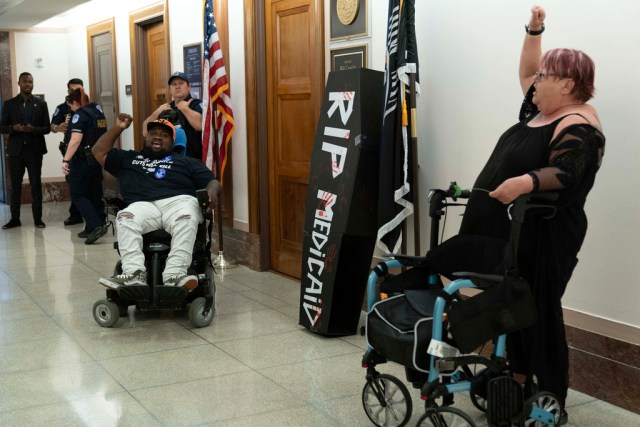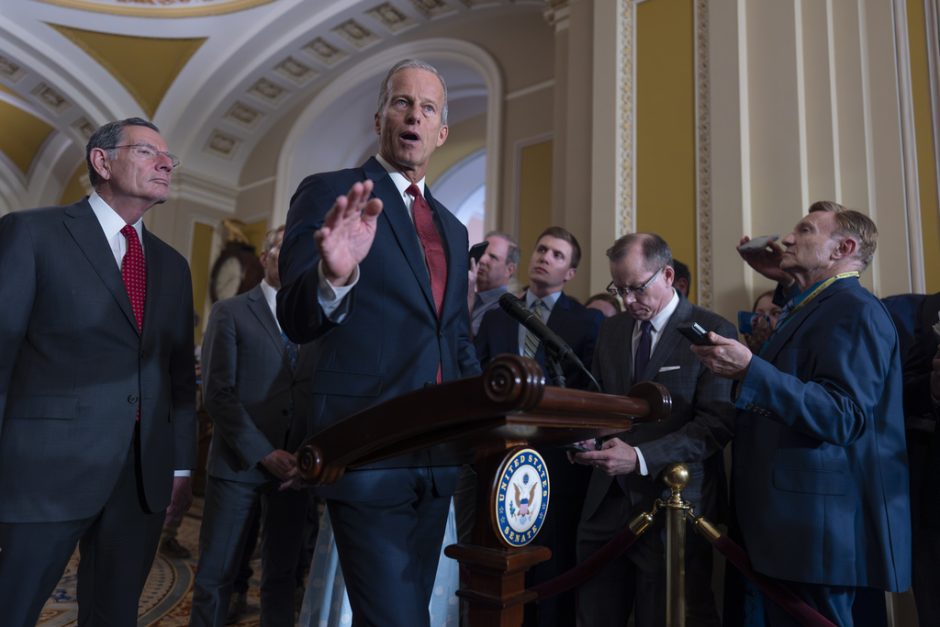

WASHINGTON – The Senate Parliamentarian dealt a serious blow to the U.S. Senate’s “big beautiful” bill on Thursday, a move that threatens President Trump’s economic agenda and spares Minnesota from some of the steep Medicaid cuts that would have cost the state hundreds of millions of dollars.
The bill is being considered under the reconciliation process, which bars the use of a filibuster but must be subject to the Byrd Rule, which prevents the inclusion of “extraneous” provisions, including those that don’t directly affect spending or revenue and those that make major increases to the deficit.
John Connolly, deputy commissioner of the Minnesota Department of Human Services and state Medicaid director, was cautious about the rulings made by Senate Parliamentarian Elizabeth MacDonough, who some angry GOP lawmakers demand to be fired.
“At this point, we aren’t sure about those provisions,” Connolly said of MacDonough’s rulings during a virtual press conference on Thursday.
A major impact of the parliamentarian’s ruling on Minnesota is the tossing of a provision that would cap the Medicaid provider tax for states that have expanded Medicaid under the Affordable Care Act.
Most states, including Minnesota, charge extra taxes to medical providers and in return give them higher Medicaid payments. Since the cost of the Medicaid program, known as Medical Assistance in Minnesota, is shared between the state and federal government, those enhanced payments bring more federal matching funds to Minnesota.
Minnesota’s provider tax is low at 1.8%. But to shore up finances in rural hospitals and other Medicaid-dependent hospitals in the state, the newly adopted state budget would raise that tax to 5.75% on participating hospitals.
The state hoped to extract an additional $1 billion a year from the federal government for their plan, which must be approved by the Centers for Medicare & Medicaid Services (CMS), but the Senate bill would cap provider taxes at 3.5%. The parliamentarian ruled that the cap violated the Byrd Rule.
But the provision has already run into political trouble, as several Senate Republicans have voiced deep concern about the provider tax cap’s impact on their rural hospitals.
House Majority Leader John Thune told reporters on Thursday that Republicans might not get “everything we want” on the provider tax, but will hopefully salvage most of the Medicaid “reforms” in the bill.
Those reforms center on new work requirements, increased out-of-pocket payments for some Medicaid recipients, and other changes in the government health program for the poor that is expected to decrease enrollment.

Connolly said his department will rush the proposed increase in the provider tax to CMS so it would be considered under current Medicaid rules.
“It will be considered in alignment with federal rules at the time,” he said.
Republican leaders in the House and Senate were relying on the provider tax change and other health care restrictions to save billions of dollars to offset the cost of trillions of dollars in tax cuts in the mega bill. Those tax cuts would make permanent a package of tax breaks Trump pushed through Congress in his first term that are expiring at the end of the year.
Another boost in the state was the Senate bill’s proposal (which was also included in the House reconciliation bill) aimed at punishing states that offered undocumented immigrants health care services.
That provision would cut the federal Medicaid reimbursement rate Minnesota receives from the federal government from 90% to 80% for those covered under the ACA’s Medicaid expansion.
Since undocumented immigrants are barred from the Medicaid program — unless they have temporary protected status or another form of permission to live in the United States — states like Minnesota pay for their health care out of state funds. So, the provision was considered more of a punishment, not a reform.
Minnesota has recently eliminated the eligibility of undocumented adults from MinnesotaCare, but the state continues to provide state-funded health care to undocumented children.
Connolly predicted that the change in the reimbursement rate would cost the state $330 million a year in lost Medicaid revenue. But MacDonough’s ruling means that may no longer happen.
Democrats rejoiced at MacDonough’s decision, saying her ruling has blown a $250 billion hole in the budget reconciliation bill’s savings.
“I think their best option at this point is to just scrap the whole thing,” said Sen. Tina Smith, D-Minn., in a post on X.
MacDonough has not yet ruled on all parts of the bill. Still undecided is whether the bill’s defunding of Planned Parenthood will pass the Byrd Rule—and the tax breaks that are at the heart of Trump’s agenda are still under review.
‘Obliterated’ or not?
A big debate in Washington, D.C. this week concerned how much damage last weekend’s air strikes on Iran’s nuclear facilities have incurred.
At a Thursday press conference, Secretary of Defense Pete Hegseth continued to parrot President Donald Trump’s assertion that the massive air strikes have ended Iran’s nuclear ambitions.
Hegseth, a Minnesota native and former Fox News show host, also derided media outlets that cited initial intelligence reports that the strikes failed to destroy key enrichment facilities and that those facilities could resume operation within months.
Hegseth and Chairman of the Joint Chiefs of Staff Gen. Dan Caine based their assessment on AI modeling of test videos of the bunker bombs used in the strikes.
Hegseth also said the intelligence reports were “leaked because someone had an agenda to try to muddy the waters and make it look like this historic strike wasn’t successful.”
Hegseth declined to answer questions about reports that Iran had removed its store of uranium from one of those sites. (Trump at a news conference during a NATO meeting in the Hague on Wednesday said it would have been too difficult for Iran to do so.)
In other news
▪️ Reporter Matthew Blake wrote about the state Legislature’s failure to approve new University of Minnesota regents, which caused a bit of a dustup because some regent decisions have created controversy. Responsibility now falls to Gov. Tim Walz, who will select four interim regents.
▪️ Reporter Brian Arola has a story about an $87 million boon to the state’s rural drinking and wastewater projects.
▪️ And we wrote about how Minnesota’s inability to keep records of gun sales meant that state authorities were likely unaware of Vance Boelter’s arsenal.
This and that
A reader questioned reports that the wife of alleged shooter Vance Boelter says she knew nothing of any plans to go on a murderous rampage targeting Democratic lawmakers.
“It has been reported that his wife was stopped leaving the area in a vehicle with guns and $10,000 in cash,” the reader wrote. “Was his large cache of guns something she was unaware of? Did she purchase any of the family’s weapons and ammunition?
“She released a statement denying knowledge and responsibility and has said she will have no further statement. I hope the authorities are considering her involvement.”
Please keep your comments, and any questions, coming. I’ll try my best to respond. Please contact me at aradelat@minnpost.com.
The post Parliamentarian’s wrench into ‘big, beautiful’ bill might spare Minnesota some Medicaid cuts appeared first on MinnPost.
















































